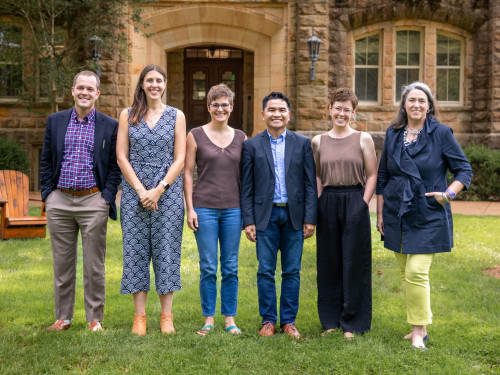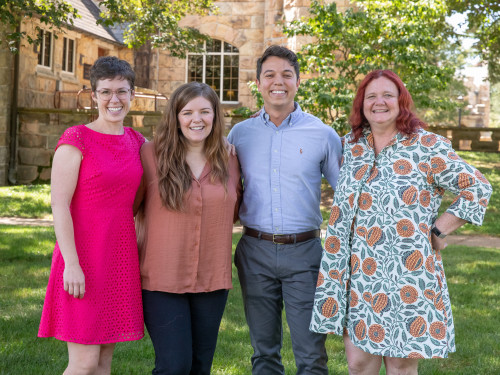Inaugural Faculty Fellows Named for Two New Programs
All Saints’ Chapel, Career Readiness, and the Office of Civic Engagement have announced the inaugural recipients of two new faculty fellowships at the University. The faculty fellows for purpose and career are: Associate Professor of Psychology Kate Cammack, Associate Professor and Chair of Politics Rae Manacsa, and Professor of English Lauryl Tucker. The faculty fellows for community engaged learning are: Associate Professor of Psychology Kate Cammack, Professor of Theatre Jennifer Matthews, Assistant Professor of Psychology Katy Morgan, and Assistant Professor of Politics Sid Simpson.
 The faculty fellows for purpose and career (pictured left with University Chaplain Peter Gray, Assistant Dean for Student Equity and Career Readiness Cassie Meyer, and Associate Dean for Integrated Advising and Career Readiness Kim Heitzenrater) will partner with Career Readiness for the next two years as they provide leadership and create opportunities for engaging students in exploration of purpose and career. Through integrating reflection into courses and departmental programs, coordinating professional development activities to share best practices with colleagues, and other innovations, the fellows will seek to support students as they navigate the path from Sewanee’s curriculum to their careers.
The faculty fellows for purpose and career (pictured left with University Chaplain Peter Gray, Assistant Dean for Student Equity and Career Readiness Cassie Meyer, and Associate Dean for Integrated Advising and Career Readiness Kim Heitzenrater) will partner with Career Readiness for the next two years as they provide leadership and create opportunities for engaging students in exploration of purpose and career. Through integrating reflection into courses and departmental programs, coordinating professional development activities to share best practices with colleagues, and other innovations, the fellows will seek to support students as they navigate the path from Sewanee’s curriculum to their careers.
“If we want to make sure that every Sewanee student can envision a lifetime of meaning and purpose, we have to bring this type of reflection into the classroom,” says Heitzenrater. “Students rely on their professors for mentorship and guidance in addition to instruction, so the faculty play an important role in helping students connect their current learning to their future selves.” Noting that the first three fellows represent a variety of academic disciplines and have already begun to incorporate career readiness into their teaching and advising, Heitzenrater sees them as perfectly positioned to lead the way in getting as many students as possible involved in these crucial discussions.
It’s an opportunity that the fellows relish. Each comes to their new role with an array of ideas and a deep passion for their work with students. In particular, Tucker looks forward to engaging with students on the bigger questions of purpose that go alongside finding a first job. “What I admire about this model,” she says, “is that it shifts these conversations ... closer to the heart of the matter.”
 This year also sees the appointment of four faculty fellows for community engaged learning (pictured right). In partnership with the Office of Civic Engagement, the fellows will each teach a community engaged learning (CEL) course, design and implement a project to further CEL at Sewanee, and mentor a faculty member who will teach a CEL course in the next academic year. “I envision that the four faculty fellows will engage their students in the community in meaningful ways,” says Amy Patterson, Carl Biehl Professor of International Affairs and director of the Office of Civic Engagement. “Their work will also serve as a model of how CEL can deepen students’ understanding of classroom learning and contribute to student formation.”
This year also sees the appointment of four faculty fellows for community engaged learning (pictured right). In partnership with the Office of Civic Engagement, the fellows will each teach a community engaged learning (CEL) course, design and implement a project to further CEL at Sewanee, and mentor a faculty member who will teach a CEL course in the next academic year. “I envision that the four faculty fellows will engage their students in the community in meaningful ways,” says Amy Patterson, Carl Biehl Professor of International Affairs and director of the Office of Civic Engagement. “Their work will also serve as a model of how CEL can deepen students’ understanding of classroom learning and contribute to student formation.”
The fellows represent three different disciplines, and each of their CEL courses—including a general education course, arts course, and lab course—showcases a different way of implementing community engagement in the academic setting. Ultimately, Patterson hopes that this partnership will advance two of the Office of Civic Engagement’s major objectives: one, building civic agency among students and challenging them to integrate learning inside and outside the classroom; and two, deepening capacity among community organizations, which can use the skills and knowledge gained from the partnership to further social justice and the public good.
Simpson, whose politics course Punishment will incorporate CEL, sees the value in working toward both objectives. “I want students to see how what we discuss in the classroom operates outside and beyond Sewanee,” says Simpson. “It's one thing, for example, to understand abstractly how hierarchies of power structure our world, but another thing altogether to see it in action and build relationships with people who've spent their lives seeking to change things.”
Both of the new fellowships are made possible in part by the support of All Saints’ Chapel (the faculty fellows for CEL program is also made possible with funding from the Bonner Foundation and the McCrickard Fund). Committed to fostering reflection on the notion of vocation, Gray sees these efforts as a natural extension of the chapel’s work helping students discover—and create for themselves—purposeful lives and purposeful work. In his view, what makes the new fellowship programs so valuable is how they bring discovery of purpose and vocation into curricular settings, where they can reach more students.
“The faculty are content experts in their fields, but students also see them as people who can help to connect the various puzzle pieces of their values, interests, and skills,” says Gray. “All of the selected fellows are thoughtful, reflective folks. They’re ready to help students ask those big ‘why’ questions.”

